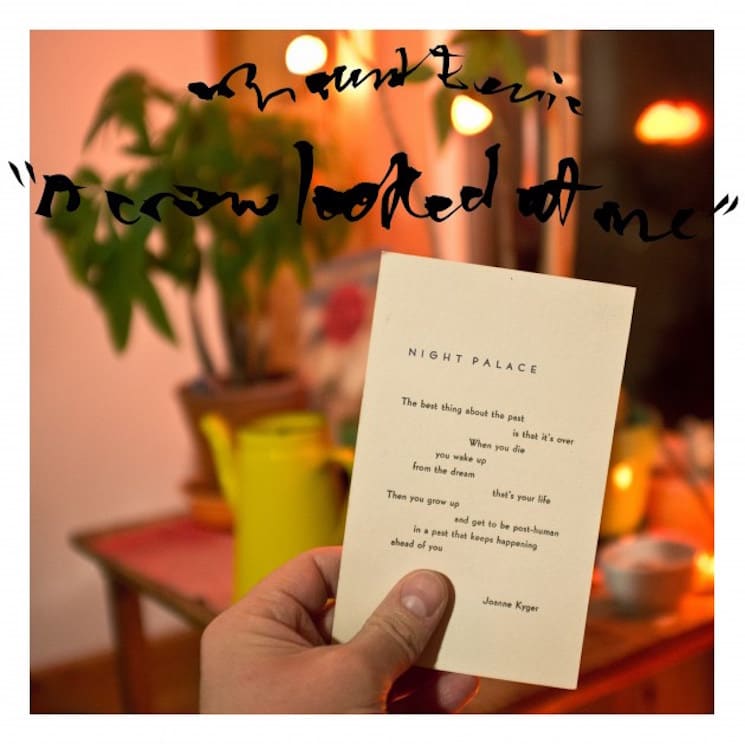When acclaimed French-Canadian cartoonist Geneviève Castrée died of pancreatic cancer last July, it only made sense that her husband, Phil Elverum, the lone member behind Mount Eerie, would write A Crow Looked at Me, a response to her untimely passing. Less a collection of songs and more one of dirges, A Crow is entirely surrounded by death. It was recorded using Castrée's instruments, in the room where she died in their home.
Composed with minimal instrumentation, Elverum's lament translates sonically and captures feelings words simply can't. There's a certain heaviness hidden in every piano key he pushes; the guitar is strummed with reluctance; the accordion emits a sorrowful whine, executed with energy and subtlety alike.
"Death is real," Elverum's fragile warble posits on the opening track, "Real Death." This statement reverberates throughout the record, though not always verbatim. Rather, it operates like a thesis. Elverum speaks directly to Castrée here in a stream-of-consciousness, second-person narrative about life without her. Heartbreaking details follow, as the process of removing the little parts of her that have been left behind appear in different songs; her tissues and toothbrush on the song "Toothbrush/Trash," throwing out her underwear on "Forest Fire" or giving away her clothes and moving on "Ravens."
Elverum cites the days and months since her death, as an uncanny way of dating the journal-like poems, which juxtapose starkly with the moments that yield a glimpse of life immediately before her death. The song "Soria Moria" unveils details about their once-private relationship, from the moment the couple first spoke to Elverum driving back alone at night from the hospital where his wife was receiving treatment.
On "Crow," the closing song, Elverum shifts focus and speaks to the couple's daughter, born only four months prior to Castrée's diagnosis, calling Geneviève by name for the first time. She's likened to different things throughout the record, like the sunset, a fly buzzing around the room and the wind. However, her final personification is a crow, a dark and mysteriously beautiful carrion bird often associated as a symbol of death.
It's difficult to imagine even the most stoic not moved to tears here; this record possesses immense power to make listeners reflect on their own relationships and mortality. A Crow Looked at Me is a grim memento of the grand injustice of losing those most precious to us.
(P.W. Elverum & Sun, Ltd.)Composed with minimal instrumentation, Elverum's lament translates sonically and captures feelings words simply can't. There's a certain heaviness hidden in every piano key he pushes; the guitar is strummed with reluctance; the accordion emits a sorrowful whine, executed with energy and subtlety alike.
"Death is real," Elverum's fragile warble posits on the opening track, "Real Death." This statement reverberates throughout the record, though not always verbatim. Rather, it operates like a thesis. Elverum speaks directly to Castrée here in a stream-of-consciousness, second-person narrative about life without her. Heartbreaking details follow, as the process of removing the little parts of her that have been left behind appear in different songs; her tissues and toothbrush on the song "Toothbrush/Trash," throwing out her underwear on "Forest Fire" or giving away her clothes and moving on "Ravens."
Elverum cites the days and months since her death, as an uncanny way of dating the journal-like poems, which juxtapose starkly with the moments that yield a glimpse of life immediately before her death. The song "Soria Moria" unveils details about their once-private relationship, from the moment the couple first spoke to Elverum driving back alone at night from the hospital where his wife was receiving treatment.
On "Crow," the closing song, Elverum shifts focus and speaks to the couple's daughter, born only four months prior to Castrée's diagnosis, calling Geneviève by name for the first time. She's likened to different things throughout the record, like the sunset, a fly buzzing around the room and the wind. However, her final personification is a crow, a dark and mysteriously beautiful carrion bird often associated as a symbol of death.
It's difficult to imagine even the most stoic not moved to tears here; this record possesses immense power to make listeners reflect on their own relationships and mortality. A Crow Looked at Me is a grim memento of the grand injustice of losing those most precious to us.
